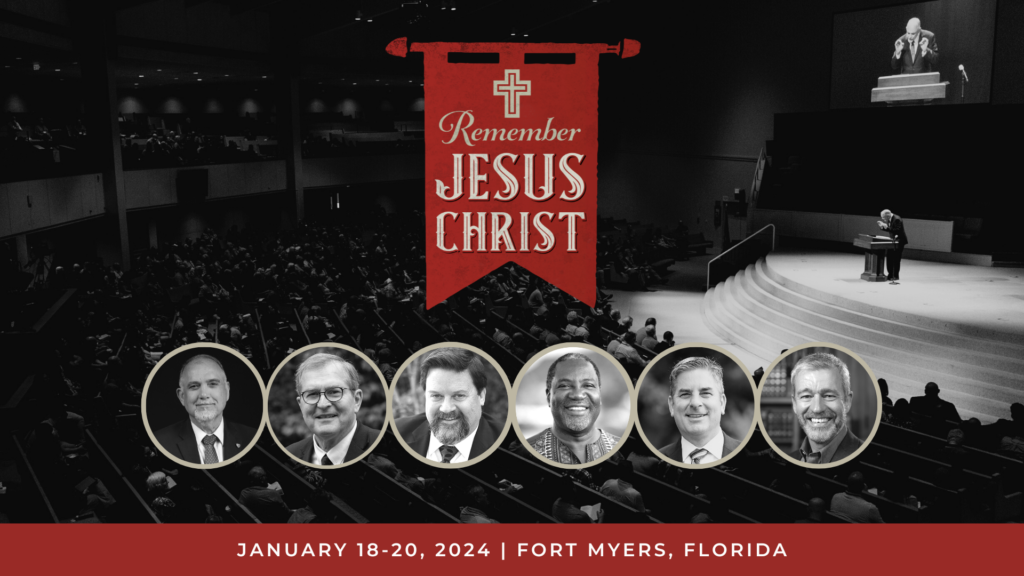This article is part 5 in a series by Tom Nettles on Remembering Jesus Christ. (Part 1, Part 2, Part 3, Part 4)
Paul’s strong emphasis on the central points of Christ’s person and work is designed to elevate the thinking of Timothy above the concerns any might have for safety and acceptance in this life, if at the same time it means proving untrue to Christ. We must remember—see the eternal covenantal purpose of God as centered on Jesus Christ—so that nothing in this life can draw us away.
One specific concern that Paul has is the power of physical and political intimidation to make us forget. He already has admonished Timothy not to be “ashamed of the testimony of our Lord or of me his prisoner” (1:8). The “testimony of our Lord,” in light of this context could refer to the words of Jesus in Mark 8:38 where Jesus is explaining what is involved in denying oneself, or losing one’s life for the sake of Christ, in order to follow Christ. “Whoever is ashamed of me and my words in this adulterous and sinful generation, of him the Son of Man also will be ashamed when He comes in the glory of His Father with the holy angels.”
That Paul in this instance has in mind physical persecution for the gospel as the challenge to the professing Christian is clear when he states, “for which I suffer hardship even to imprisonment as a criminal” (9). His suffering was well-known by Timothy (3:10, 11). Paul admonished him, “Suffer hardship with me, as a good soldier of Christ Jesus” (2:3).
Paul had a two-fold purpose in referring to his various sufferings for “my gospel.” One, his suffering sealed in his experience the absoluteness of the gospel. He was willing to lose all including life because of the “surpassing worth of knowing Christ Jesus my Lord for whom I have suffered the loss of all things.” He even desired to know “the fellowship of his sufferings, being conformed to his death” (Philippians 3:8, 10). He was, in fact, at that moment contemplating that soon his life would be taken for he knew that “the time of my departure has come” (4:6). Nothing, therefore, could dissuade Paul from his clear and convinced proclamation of the finality, absoluteness, and consummate truthfulness of “Jesus Christ, risen from the dead, of a seed of David, as preached in my gospel.” He had come to believe, embrace, cast the very essence of his existence on the truth of the proposition that “the sufferings of this present time are not worthy to be compared with the glory which shall be revealed in us” (Romans 8:18). If the former enemy, willing to imprison and kill those who believed the gospel had changed so radically that he now gladly suffered imprisonment and the prospect of a martyr’s death, who could doubt the certainty of his conviction? Who, but the most irrational skeptic, could deny the truth of Paul’s message?
The gospel will not fail; it will prevail, and its power will be manifest in the faithful suffering of his people.
Second, Paul not only used his suffering to glory in the truth of the gospel, but also its power. “The word of God is not chained, imprisoned, or bound in any way” (9). The divinely-ordained harmony in the use of means in service of absolute sovereignty must be contemplated with reverence when we read, “For this reason I endure all things for the sake of the elect, those who are chosen, so that they also, along with me, may obtain the salvation which is in Christ Jesus and with it eternal glory” (10). Elect in Christ in eternity past, saved in Christ in this present age, secured in Christ for undiminished joy for the eternal age yet to be. The gospel will not fail; it will prevail, and its power will be manifest in the faithful suffering of his people. Even in the face of heresy, Paul can affirm, “Nevertheless, the firm foundation of God stands, having this seal, ‘The Lord knows those who are His.’”(19).
The gospel proceeds into the world through suffering, succeeds through suffering, and gives power to endure suffering. The gospel certainly will succeed, and Christ will lose none of his sheep; not a one for whom the Shepherd has died will fail to enter the sheepfold. But such certainty arises and is perfected in suffering: Christ suffered and died; the blood of the martyrs is the seed of the church; and believers will choose eternal life in Christ even in the face of the threat of death for believing. “How unworthy it is,” Calvin proposes, “that we should think more of the fleeting life of this world than of the Holy Name of the Son of God.”
Paul summarizes this amazing integration of certainty secured through endurance by means of a confession or hymn called a “faithful saying” used in the apostolic church to teach this truth. It has a memorable pattern of rhyme and rhythm in Greek. Responses and results of true belief are set in parallel with responses and results of faithlessness to Paul’s gospel. The one whose faith arises from the electing purpose of God endures; the one left to his own faculties, will wilt under pressure.
For if together with him we die, also together with him we live;
If we endure the load, we will also reign with him.
If we shall deny him, also that very one He will deny.
If we prove to be without faith, He remains faithful,
For to deny Himself he is unable.
Dying with Christ refers to His propitiatory substitution for his people and implies their willingness to share his earthly suffering. Atoned for objectively and suffering experientially means that we attain the resurrection of the just. The other points of the confession naturally follow. It ends with the strong affirmation of the unperturbed eternal decree of God and the immutable truthfulness of his threats toward unbelief.
The gospel proceeds into the world through suffering, succeeds through suffering, and gives power to endure suffering.
This hymn also is reminiscent of the words of Jesus when he commissioned and instructed the twelve prior to their mission including warnings about persecution: “Whoever confesses me before men, him will I also confess before my Father who is in heaven. But whoever denies me before men, him will I also deny before my Father which is in heaven” (Matthew 10:32, 33). Jesus words were meant for the hearer and the preacher, of whom one was Judas. Remarking on this passage in 2 Timothy, Calvin wrote, “His threat is directed to those who from terror of persecution give up their profession of Christ’s name.” The admonition that has led to this sobering discussion is “Remember Jesus Christ, risen from the dead, of a seed of David, according to my gospel.”
In discussing this passage with a PhD student from SBTS, Michael Carlino, he sent the following response after looking at both the language and the entire theological context of the hymnic confession. I found his remarks helpful and faithful to the text. “It would seem irresponsible exegetically to suggest that God will be faithful to the faithless by granting salvation in 13, because Paul is explaining in 13 why God is just and good in denying the apostate. For God to not deny the one who doesn’t endure/denies him, would be for God to deny his own character/nature. And it would then take away from the glory of verse 11, which promises that those who share in Christ’s sufferings will indeed reign with him. For, if God can deny himself and grant salvation to the apostate, the elect who endure unto death have no confidence in God’s trustworthiness. In other words, Paul is teaching that God’s denying of the apostate flows from God’s immutable character, just as the assurance of God’s receiving of his saints flows from God’s immutable character.”
Those who are apostate, those who fall away from what they have professed, have never had the root of the new birth. That heaven-wrought transaction shifts the affections from the world to the glory of God as seen in Christ. Something else—arising from threat, covetousness, intellectual fascination, or flattery—has shown that their most abiding affection is for the world and not Christ. Paul assures us that “He who began the good work in you will bring it to completion until the day of Christ Jesus” (Philippians 1:6).
Again, we see what a pervasive and existentially profound theological admonition Paul gives in saying, “Remember Jesus Christ, risen from the dead, of a seed of David, according to my gospel.”
This article is part 5 in a series by Tom Nettles on Remembering Jesus Christ.
Join us at the 2024 National Founders Conference on January 18-20 as we consider what it means to “Remember Jesus Christ” under the teaching of Tom Ascol, Joel Beeke, Paul Washer, Phil Johnson, Conrad Mbewe and Travis Allen.
























